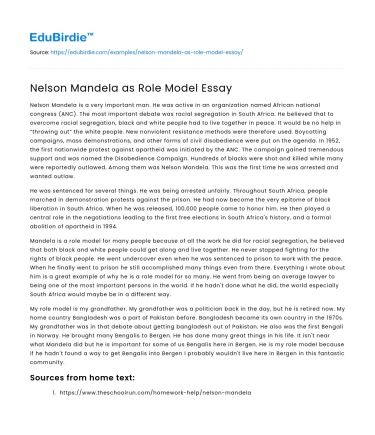Introduction
Nelson Mandela stands as an emblematic figure in the annals of history, revered for his unyielding dedication to justice and equality. Born in 1918 in the rural village of Mvezo, South Africa, Mandela's journey from a humble beginning to becoming the first black President of South Africa is a testament to his extraordinary leadership and resilience. His life was characterized by a relentless fight against the apartheid regime—a system of institutionalized racial segregation and discrimination. Mandela's unwavering commitment to non-violence, even in the face of personal and communal adversity, cements his status as a quintessential role model. This essay delves into Mandela’s life, examining his leadership qualities and the enduring impact of his legacy. By analyzing specific instances from his life, this paper will underscore Mandela's role as a beacon of hope and a model of ethical leadership in the modern age.
Mandela's Unyielding Leadership and Vision
Nelson Mandela's leadership was marked by an unyielding vision for a democratic and free society where all citizens would be equal. His leadership was rooted in his deep understanding of human rights and social justice, which he tirelessly advocated for throughout his life. One of the most significant examples of his leadership was his role in the African National Congress (ANC), where he led the fight against apartheid through strategic planning and advocacy. According to Mandela's autobiography, "Long Walk to Freedom," he believed that "courage is not the absence of fear, but the triumph over it." This belief was instrumental in guiding his actions and decisions.
Save your time!
We can take care of your essay
- Proper editing and formatting
- Free revision, title page, and bibliography
- Flexible prices and money-back guarantee
During his 27 years of imprisonment, Mandela's resolve did not waver. Instead, he used this period to reflect and strategize, emerging as a symbol of resistance against oppression. His ability to forgive his oppressors and work towards reconciliation instead of revenge was pivotal in uniting a deeply divided nation. Mandela's leadership was further exemplified when he became South Africa's first black president in 1994. He prioritized national reconciliation, establishing the Truth and Reconciliation Commission to address the injustices of apartheid. This move showcased his commitment to healing rather than retaliating, setting a precedent for future leaders globally.
Transitioning to Mandela's broader impact, it is essential to note that his leadership transcended South African borders, influencing global movements for justice and equality. His life work continues to inspire leaders and activists worldwide, emphasizing the power of resilience and forgiveness in the pursuit of justice. Mandela's leadership was not without criticism; some argued that his approach was too lenient towards former oppressors. However, by focusing on reconciliation, Mandela prevented a potential civil war and laid the foundation for a democratic South Africa, which underscores the depth and foresight of his leadership.
Resilience and the Power of Forgiveness
Resilience is a defining trait of Nelson Mandela's life and legacy. His ability to endure hardship and remain steadfast in his beliefs serves as an inspirational model of perseverance. Mandela’s resilience was most evident during his imprisonment on Robben Island, where he faced harsh conditions and isolation. Despite these challenges, he remained resolute in his commitment to achieving freedom for his people. Mandela's resilience was not just physical but also emotional and psychological, as he continuously advocated for a peaceful transition from apartheid to a democratic society.
Forgiveness played a crucial role in Mandela's philosophy and leadership. He famously said, "Resentment is like drinking poison and then hoping it will kill your enemies." This ethos of forgiveness was central to Mandela's approach to dismantling apartheid, as he understood that harboring hatred would only perpetuate division and conflict. His decision to invite his former jailers to his presidential inauguration symbolized his commitment to reconciliation and unity. Mandela's capacity to forgive was not an act of weakness but a strategic choice that facilitated the rebuilding of a fractured nation.
While some critics perceived Mandela's emphasis on forgiveness as overly conciliatory, it is undeniable that his approach prevented further bloodshed and established a foundation for peace. Mandela's resilience and capacity for forgiveness serve as influential lessons for contemporary leaders facing their own societal challenges. In a world often marred by conflict and division, Mandela's legacy continues to inspire efforts toward peaceful resolution and reconciliation. His life exemplifies how resilience and forgiveness can be powerful tools in achieving lasting change and justice.
Conclusion
Nelson Mandela's legacy as a role model of leadership and resilience is undisputed. His life is a testament to the power of vision, courage, and forgiveness in overcoming adversity and achieving monumental change. Mandela's leadership in dismantling apartheid and fostering reconciliation in South Africa serves as a blueprint for ethical leadership in the face of societal challenges. His emphasis on unity, forgiveness, and resilience remains relevant today, inspiring leaders and individuals worldwide to strive for justice and equality.
As we reflect on Mandela's contributions, it becomes evident that his impact extends far beyond his lifetime. His teachings and actions continue to influence global movements for social justice, underscoring the enduring power of his legacy. By examining Mandela’s life, we gain valuable insights into the qualities that define effective and ethical leadership. Nelson Mandela's story is not just a historical narrative but a continuing source of inspiration for future generations aspiring to effect positive change in the world.






 Stuck on your essay?
Stuck on your essay?

